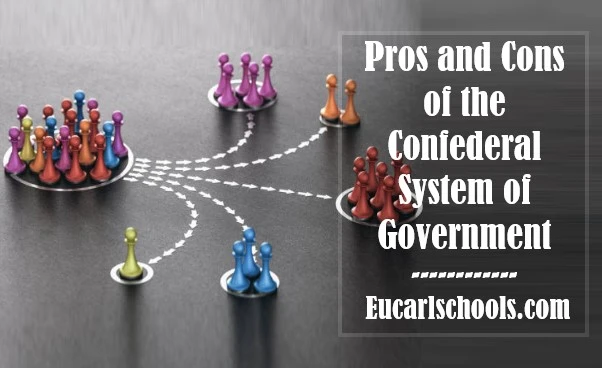Pros and Cons of the Confederal System of Government
The confederal system occupies the other extreme in terms of centralization of government. A confederal system of government is a loose relationship among a number of smaller political units.
The vast majority of political power and authority in the confederal system of government rests with the local governments whilst the central and federal government has to contend for the quite little power left.
Local governments have a greater latitude to act as they wish, but this freedom may times degenerates into conflicts between the state and the federal system of government. In some instances, the confederal system of government is just a little more than a union between independent states.
What is a Confederal System of Government

A confederation (also known as a confederal system of government) is a collection of independent states, joined together for the sole aim of common action generally in relation to other states. A Confederate statue is usually created by a pact.
A confederal system in a particular nation of the world even in those smallest towns tends to be organized for handling very critical matters which include but are not limited to defense and security, foreign and international relations, domestic trade, or currency, with the general government being required to provide support for all its members.
The American confederal system which is also known as the Confederate States of America—which governed the South during the Civil world war between the richest countries at the time is the best-known example that qualifies as a confederal system of government, but there have been others.
In fact, the first government of the United States, created by the Articles of Confederation (completed in 1777), was this exact type of system. Right now, Belgium basically runs a confederation between two largely independent states, In the north, we have Flanders and Wallonia in the south.
A confederal system of government is one in which sovereign states delegate power to a central government for very peculiar purposes. In 1981, The Gambia and Senegal came together to form what is known as the Senegambian Confederation which later collapsed in 1989, a quite popular African example of the Confederate system.
The exactness of the relationship among each member state constituting a country operating the confederate state varies considerably. In the same vein, the relationship between the member states and the general government in these countries, and the distribution of powers among them is highly variable.
Some countries that operate a confederal system are nothing different from the popular international organizations. Other nations practicing this confederal system with stricter rules may just resemble federal systems. Since the member states of a confederal system retain their sovereignty, they have a subtle right to secession.
Under a confederal system arrangement, in sharp contrast with a federal one, the central authority is notably quite weak. Decisions made by the general government in a unicameral legislature, a council of the member states, require consequent implementation by the member states to take effect.
They are therefore not laws binding directly upon the individual, but instead have more of the characteristic of inter-state agreements. Also, decision-making in the general government usually proceeds by consensus (unanimity) and not by majority, which makes for a slow and inefficient government.
These problematic features, limiting the effectiveness of the union, mean that political pressure tends to build over time for the transition to a federal system of government, as happened in the American, Swiss, German and European cases of regional integration.
How Does the Federal System Stand Apart From a Confederal System?
The federal system differs from a confederal system in the sense that the general level of government is secondary to the regional level, and from devolution within a unitary state, in which the regional level of government is subordinate to the general level.
It represents the central form in the pathway of regional integration or separation, bounded on the less integrated side by confederalism and on the more integrated side by devolution within a unitary state. Note that devolution means the transfer or delegation of power to a lower level, especially by the central government to the local or regional administration.
Features of Confederal Systems of Government
A confederal system is made up of two or more independent states. It must be said that the component states are allowed to remain as separate international entities reserving for them the power to handle their own foreign policy.
The central government is usually weak while the component units are rather strong.
The confederal system of government depends upon the other component states to contribute military resources to defend the confederation.
When it comes to power-sharing, the component states in a confederal system are vested with exclusive powers while the residual powers are reserved for the central government.
In a confederal system, the constitution allows for any of the component units to secede from the others at any time if it so desires. This is a sharp contrast to the federal system of government where the right of breakaway is usually disallowed.
Consensus has it that citizens are known to show loyalty to the component states rather than their allegiance staying with the central government.






